Popular games for collection Famicom Mukashibanashi
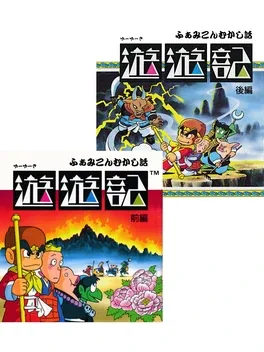
Famicom Mukashibanashi: Yuuyuuki is a 2-part Famicom Disk System game. Yuuyuki is an adventure game played by choosing from several text commands shown on screen. It resembles its predecessor, Shin Onigashima, in its implementation of the "Change Character" command, usage of traditional Japanese fairytales, and general screen layout and appearance. The story-line is a parody of the Chinese novel Journey to the West, where two main characters, Goku and Chao, embark upon separate journeys to find one another. In Yuuyuki, the "Change Character" command can switch between a maximum of five different characters. However, there are very few points in the game where it can actually be used to such extent. Its main use is to switch between Goku and the others accompanying him. Like Shin Onigashima, the character in use can greatly affect the descriptive text shown on screen, and the significant increase in number of characters allowed for more variety in each scene. It is possible to enjoy the game by viewing the reactions towards choosing completely unrelated characters or commands in certain situations. While Shin Onigashima demanded rather complex puzzle-solving abilities, Yuuyuki mainly focuses on having the player carefully read and understand the story-line. Puzzles are solved easily in this game, and very few choices actually lead to a "game over" screen. Easy trivia questions and simple action gameplay emerge at certain points, and players may find themselves searching for the obvious answer on screen more often than thinking hard to solve the puzzle at hand. Main changes in gameplay from Shin Onigashima include the implementation of the "Ittaisan" command, which saves progress at any point during the game, and faster animation of game text. The shortening in load time after choosing commands, and an overall decrease in difficulty allowed Yuuyuki to run at a much quicker tempo than its predecessor.
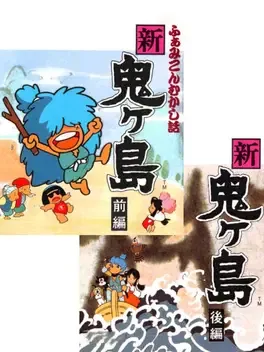
Famicom Mukashi Banashi: Shin Onigashima - Zengohen (Famicom Fairytales: New Island of Ogres - Part 1+2) is a game that ports both Part 1 (Zenpen) and Part 2 (Kouhen) games from the original Famicom Disk System releases to be played as a complete game. This version was first released on the Wii Virtual Console, but the first time that both parts were ported together was in the Famicom Mini Series for the Game Boy Advance.
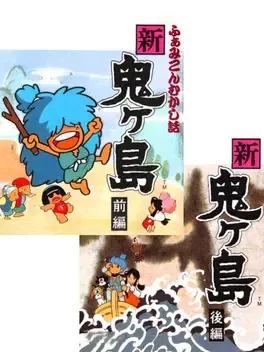
Famicom Mukashibanashi: Shin Onigashima is a Famicom Disk System text adventure game. The plot revolves around an elderly couple with no children who adopt an infant boy and girl. When the children turn six, a dragon appears in the country, and starts turning people into Oni who steal the souls of others. The Oni arrive at their home and steal the elderly couple's souls. The children decide to save their adoptive parents. The game is controlled by selecting commands such as the "Change Character" command, which allows you to switch between controlling Donbe (the boy) and Hikari (the girl). The game progress is shown by changes in the in-game graphics. The Famicom Disk System version comes on two disks released on different dates. Disk 2 cannot be played without completing Disk 1, and is switched while the system is still powered on. All later releases are switch-free.
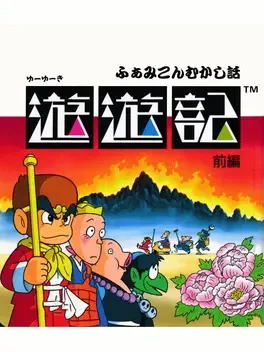
Yuuyuki is an adventure game played by choosing from several text commands shown on screen. It resembles its predecessor, Shin Onigashima, in its implementation of the "Change Character" command, usage of traditional Japanese fairytales, and general screen layout and appearance. The story-line is a parody of the Chinese novel Journey to the West, where two main characters, Goku and Chao, embark upon separate journeys to find one another. In Yuuyuki, the "Change Character" command can switch between a maximum of five different characters. However, there are very few points in the game where it can actually be used to such extent. Its main use is to switch between Goku and the others accompanying him. Like Shin Onigashima, the character in use can greatly affect the descriptive text shown on screen, and the significant increase in number of characters allowed for more variety in each scene. It is possible to enjoy the game by viewing the reactions towards choosing completely unrelated characters or commands in certain situations. While Shin Onigashima demanded rather complex puzzle-solving abilities, Yuuyuki mainly focuses on having the player carefully read and understand the story-line. Puzzles are solved easily in this game, and very few choices actually lead to a "game over" screen. Easy trivia questions and simple action gameplay emerge at certain points, and players may find themselves searching for the obvious answer on screen more often than thinking hard to solve the puzzle at hand. Main changes in gameplay from Shin Onigashima include the implementation of the "Ittaisan" command, which saves progress at any point during the game, and faster animation of game text. The shortening in load time after choosing commands, and an overall decrease in difficulty allowed Yuuyuki to run at a much quicker tempo than its predecessor.
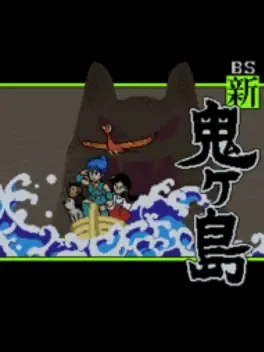
BS Shin Onigashima is a Downloadable 4-part Soundlink game for the Satellaview that was broadcast in at least 2 distinct runs between September 29, 1996 and January 31, 1996. The game was popular and won its December 1997 rebroadcast through the votes of players in the Third Player's Choice competition. The game came in second (in terms of votes) to BS SimCity: Machi Tsukuri Taikai and so it was broadcast second as a 4-day broadcast. BS Shin Onigashima was a remake sequel to the earlier Shin Onigashima, a game that was released for the Famicom Disk System in September of 1987. The major difference between the two games relate to the SoundLink elements that were introduced for the Satellaview broadcasts. BS Shin Onigashima was later re-made in December 1997 as the commercial release, Heisei Shin Onigashima, for the Nintendo Power system. This was later followed-up by the May 1998 Super Famicom cartridge release of the same name.
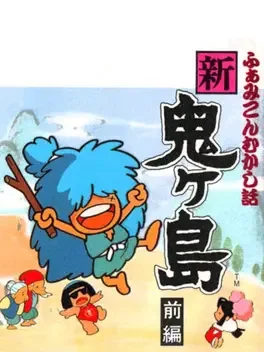
Shin Onigashima is a two disk adventure game released on the Famicom Disk System. Despite being first-party software, it was never released outside of Japan. A two-disk adventure game, Shin Onigashima (or to give it its full title "Famicom Mukashi Banashi: Shin Onigashima", or "Famicom Fairy Tales: New Oni Island" thereabouts) was released in two parts: The first on September 4th 1987 and the second on September 20 1987. The Game stops halfway through the story. The game is depicted like other adventure games for the system, such as Portopia or Hokkaido Serial Murders, though with a far gentler fairy tale presentation rather than a gritty crime thriller. The game's story is based on popular centuries-old Japanese folklore, such as the story of Momotaro and tales depicting the demonic Oni and their mischief. The original characters created for this game would be later referenced by future Nintendo products with retrospective elements, such as Captain Rainbow or the Super Smash Bros series (SSB Brawl even had a remixed version of Shin Onigashima's music for the Ice Climbers stage).
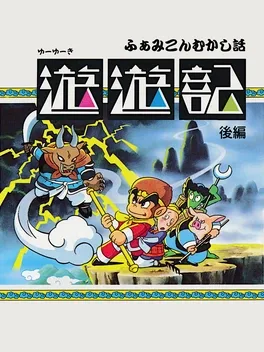
This is the 2nd chapter in this series. Yuuyuki is an adventure game played by choosing from several text commands shown on screen. It resembles its predecessor, Shin Onigashima, in its implementation of the "Change Character" command, usage of traditional Japanese fairytales, and general screen layout and appearance. The story-line is a parody of the Chinese novel Journey to the West, where two main characters, Goku and Chao, embark upon separate journeys to find one another. In Yuuyuki, the "Change Character" command can switch between a maximum of five different characters. However, there are very few points in the game where it can actually be used to such extent. Its main use is to switch between Goku and the others accompanying him. Like Shin Onigashima, the character in use can greatly affect the descriptive text shown on screen, and the significant increase in number of characters allowed for more variety in each scene. It is possible to enjoy the game by viewing the reactions towards choosing completely unrelated characters or commands in certain situations. While Shin Onigashima demanded rather complex puzzle-solving abilities, Yuuyuki mainly focuses on having the player carefully read and understand the story-line. Puzzles are solved easily in this game, and very few choices actually lead to a "game over" screen. Easy trivia questions and simple action gameplay emerge at certain points, and players may find themselves searching for the obvious answer on screen more often than thinking hard to solve the puzzle at hand. Main changes in gameplay from Shin Onigashima include the implementation of the "Ittaisan" command, which saves progress at any point during the game, and faster animation of game text. The shortening in load time after choosing commands, and an overall decrease in difficulty allowed Yuuyuki to run at a much quicker tempo than its predecessor.
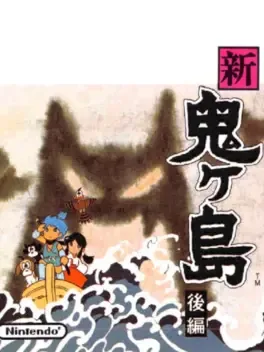
Shin Onigashima is a two disk adventure game released on the Famicom Disk System. Despite being first-party software, it was never released outside of Japan. A two-disk adventure game, Shin Onigashima (or to give it its full title "Famicom Mukashi Banashi: Shin Onigashima", or "Famicom Fairy Tales: New Oni Island" thereabouts) was released in two parts: The first on September 4th 1987 and the second on September 20 1987. This latter part needs a cleared save file from the first part to play, meaning it is functionally an expansion of that game. The game is depicted like other adventure games for the system, such as Portopia or Hokkaido Serial Murders, though with a far gentler fairy tale presentation rather than a gritty crime thriller. The game's story is based on popular centuries-old Japanese folklore, such as the story of Momotaro and tales depicting the demonic Oni and their mischief. The original characters created for this game would be later referenced by future Nintendo products with retrospective elements, such as Captain Rainbow or the Super Smash Bros series (SSB Brawl even had a remixed version of Shin Onigashima's music for the Ice Climbers stage).